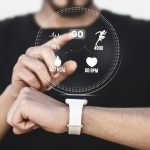Stay cool anywhere: UCLA’s tiny pump revolutionizes wearable cooling
UCLA scientists have created a new type of cooling technology that could transform how we stay comfortable in the heat.
Using thin, flexible materials, their...
How drones are revolutionizing delivery services
Drones, once a futuristic concept, are now becoming an integral part of modern delivery services. These small, unmanned flying machines are transforming how goods...
Engineers create tiny switch to make the Internet faster and smarter
Every second, terabytes of data—enough to download thousands of movies—travel through fiber-optic cables as light.
These cables act like super-fast highways, moving information around the...
Are biodegradable electronics the future of eco-friendly tech?
Imagine a world where your old gadgets disappear like fallen leaves, breaking down harmlessly into the environment instead of piling up in landfills.
This vision...
AI redesigns wireless chips with strange, high-performance patterns
Designing wireless microchips, essential for cutting-edge technologies like faster internet and autonomous driving, has always been a complex and expensive task.
But now, artificial intelligence...
Advancements in smart wearable fitness technology
In recent years, wearable fitness technology has revolutionized the way we track and improve our health. From simple step counters to advanced devices that...
Scientists develop quantum chip that could change the future of computing
Scientists at the University of Chicago's Pritzker School of Molecular Engineering (PME) have created an innovative design for a quantum processor that could pave...
Augmented reality transforms education one lesson at a time
Imagine a classroom where you can explore ancient ruins without leaving your seat or watch a human heart pump blood in 3D.
This is the...
New tool turns presentation videos into searchable PDF summaries
Watching presentation videos can be a great way to learn, but they often take up a lot of time and storage space.
Finding specific information...
Engineers create world’s first deep-UV microLED display chips
A team of engineers at the Hong Kong University of Science and Technology (HKUST) has made a groundbreaking invention in semiconductor technology.
They have developed...










